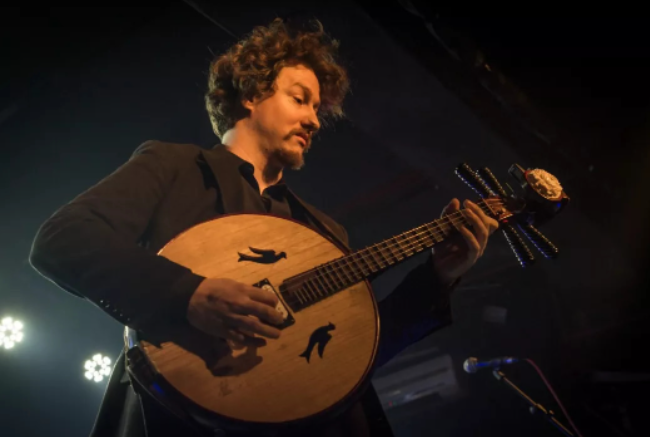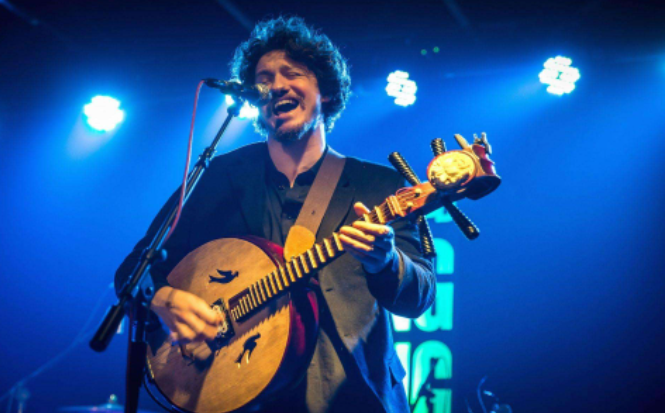Frenchman Zhang Si'an meets Zhongruan and ancient poetry in China
"Flowers are not flowers, fog is not fog, midnight comes and dawn goes", the classical Chinese poem "Flowers is not a flower" was played by French musician Zhang Sian's Zhongruan, soft and melodious, gentle and lingering. Suddenly, the tune changed, and the high-pitched and vigorous melody of "Unrestrained Horse" seemed to put people in the vast prairie where thousands of horses roared.
French people in China meet Zhongruan and ancient poetry
With curly blond hair and light-colored eyes, the western-looking Frenchman Zhang Sian has a soft spot for Chinese classical musical instruments. He was one of the first foreigners in China to try to interpret songs and music in Chinese, and the first foreigner to compose and play popular music with the Chinese instrument "Zhongruan".

In 2000, 20-year-old Zhang Sian came to Beijing from Bordeaux, France, and watched a Peking Opera performance at Dashilan, Qianmen. Since then, he fell in love with traditional Chinese folk music, and began to teach himself Zhongruan and create. "When I first played Zhongruan on the stage, a Chinese audience asked me what kind of musical instrument it was. When I told them it was a traditional Chinese musical instrument, they were surprised and appreciated it." Zhang Si'an recalled. Twenty years later, similar problems have become rarer.
"I like to add a lot of fresh elements to music." Zhang Sian said that he likes ancient Chinese poetry, so every time he came across a favorite ancient poetry, he would use Zhongruan to compose a song for it and make a song. His favorite ancient poem is Bai Juyi's "Flowers Are Not Flowers". He feels that this poem is both about everything and seems to be empty. As a result, the far-reaching artistic conception of the ethereal ancient poems is hazy and rhythmic under his Zhongruan performance.
Give Zhongruan new life and use music to communicate different cultures
"These ancient musical instruments handed down from China are particularly interesting to me. I want to modernize these ancient musical instruments and give them new life." In Zhang Sian's view, "Many people regard Zhongruan as something of the past. , too old. But I still play because for me, the past, the present and the future are closely linked."

In Zhang Sian's music world, he can also endow Zhongruan with gorgeous, unrestrained and enthusiastic qualities by playing jazz. "I created the electronic Zhongruan by myself. I want to electronicize these ancient instruments and develop them into modern music." He believes that music is a medium between ancient and modern, and a bridge between different cultures.
In the introduction of Zhang Sian's album "Bridge", he and his band hope to build a bridge connecting cultural boundaries through music. The bridge transcends the boundaries of musical styles, allowing listeners to travel in time and space, from east to west, from the past to the future. This album best reflects Zhang Sian's musical philosophy.
"Beijing gives me a hometown feel"
Every time he introduced his name, Zhang Sian would say, "My name is Zhang Sian, thinking thinking, safe Ann." He felt that this name was not only transliterated to his French name Jean-Sébastien (Jean-Sébastien). , which is more in line with his own personality - like thinking, yearning for comfort. Writing music, working, thinking about the future, and traveling, constitute Zhang Sian's life. Zhang Sian said seriously that the music he made is all about the perception of life.
Traveling all over the vast majority of provinces in China, Zhang Sian admitted that his favorite city is Beijing, and he feels that Beijing can give him a sense of hometown. "As long as I go out for a long time without returning to Beijing, I will miss the city like homesickness." In Beijing, Zhang Sian has met many outstanding musicians. In his opinion, Beijing is a city with the richest cultural and artistic atmosphere: "Beijing is full of talents, gathering the best musicians, artists, and art creators in China. They exchange and learn from each other here, and their artistic level will be improved more and more here.”
Not only because Beijing has a strong artistic creation atmosphere, but also because of the city's various cuisines that attract Zhang Sian. When he first came to Beijing, Zhang Sian lived in a hutong. Many old Beijingers invited him to dinner at home. The fried noodles and dumplings made him feel the temptation on the tip of the eastern tongue. "The Peking duck is also very delicious, and I was particularly impressed." Zhang Sian said.
"Like France, there are too many delicacies in different parts of China, and the cultures in different parts of China are different. Only when you really come to China can you understand the real China." After living in China for 20 years, Zhang Si'an hopes that China - which he deeply loves The country can be more comprehensively and deeply understood by more people in the world.
 渝公网安备 50010702504639号
渝公网安备 50010702504639号